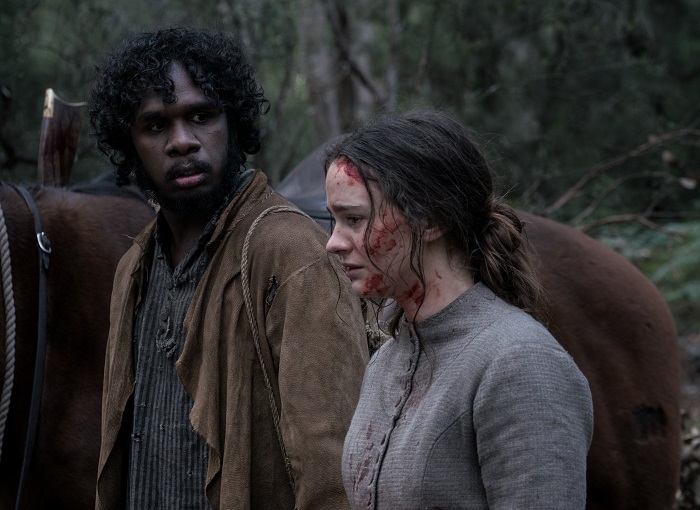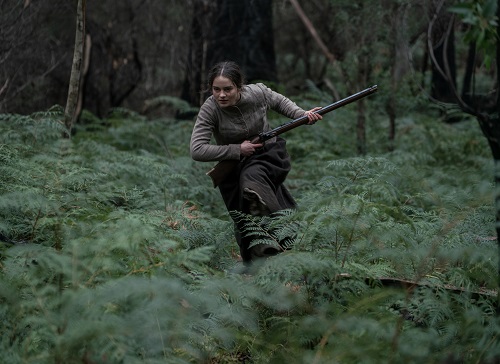By Roxana Hadadi | Film | November 1, 2019

The Nightingale, filmmaker Jennifer Kent’s follow-up to her horror breakthrough The Babadook, does not let up. This is a movie that is 136 minutes long that took me nearly 3 hours to watch at home because I kept pausing it to collect myself, to get a drink, to hug my partner. I’m not sure I’ve seen a movie this ceaselessly brutal since 12 Years a Slave, and I don’t think I’ll ever be able to watch The Nightingale again, and yet I haven’t stopped thinking about the film since I watched it.
The film is a harrowingly grim, nearly universally bleak challenge to patriarchy, racism, and colonialism; a movie that will nearly drown you in suffering; an experience driven by rage and grief and pain—and by the female centering of those emotions. The Nightingale is a rape revenge story, kind of, but more so an exploration into the depths which humanity will sink to in its lust for dominance and superiority, and the bodies and carnage left behind by that desire. If you didn’t hate white men already, whew, you will! Misandry, motherfuckers. MISANDRY.
The Nightingale is set in the Australian island of Tasmania in 1825, which back then was called Van Diemen’s Land. Where we start on the island, in the south, looks straight out of Wuthering Heights, with thick mist and fog, lush green forests, and ferns and moss. And, naturally, it is all being destroyed and ripped apart in the name of English expansion and colonial conquest. The location of a prison full of convicts of both genders and all ages, the area is run by British Lt. Hawkins (Sam Claflin, horrifying), who has served 3 years in a place he considers a shithole. He’s desperate to get out, to earn a promotion to a more civilized area of the country—but he’s also a drunk, incompetent, barely able to get his men to respect him. He holds a certain small amount of power and is absolutely demonic in wielding it, as seen by his constant abuse of the Irish convict Clare (an astonishing Aisling Franciosi, Lyanna Stark of Game of Thrones and also from The Fall).

After serving 7 years, Clare now works for Lt. Hawkins, who considers her his property and lets her know it. He allowed her to get married and have a child, but he refuses to give her a letter of recommendation so that she can leave his employ. It amuses him, instead, to force her to put on a pretty dress and sing for his leering soldiers (“our little nightingale,” he calls her); to force her into his bedroom, where he makes her sing for him alone; to force her over a table and rape her. Everything he says to her is an exercise in gaslighting: “Didn’t I rescue you from that hellhole of a prison? They warned me you’d be too much trouble. I took you on anyway”; “You’re doing this deliberately … to get at me,” he says of her crying; “I decide when you leave and when you stay.”
Hawkins is a tyrant, and Clare is his captive, and something truly, disastrously awful puts her on the path toward revenge, chasing Hawkins as he leaves the village toward a new position. And Clare, for all the trauma and suffering she’s been through, is just as racist as Hawkins is: She treats the Aboriginal Islanders of Van Diemen’s Land like scum, like muck, like the mud she must trudge through toward a better future. She knows she has to trust the young tracker Billy (a phenomenally wonderful Baykali Ganambarr) to guide her toward Hawkins, but we know how she looks at people who look like Billy. She calls them “boy.” She grips a knife when she has to walk into the forest alone. She has had unspeakable horrors committed against her, but she cannot comprehend that the same forces who enacted the patriarchal structures that treat her as property are the same colonialist powers that treat people like Billy as property, too.
Billy, for his part, has no patience for this woman. He took the job because he needs the money she offered, but Clare has lied to him about why she needs to catch up with Hawkins, and he’s not particularly interested in finding her true motivations. Clare is just as white to him as the men who came to his land, who killed his family, who tried to force him to abandon his culture. “I am Letteremairrener man,” he insists, and just as Clare compared herself with a nightingale, Billy compares himself with a blackbird. “White fellow way is shit way,” he knows, and although he and Clare have both been brutalized and victimized, he refuses to give up his selfhood for hers.

The Nightingale starts with an onslaught of violence that sets the tone for what is to come next; each initial action has a prolonged reaction. Clare is raped, which sets off her own violent choices that in turn haunt her; she has nightmares of bodies come back to life, hunting her down, shouting her crimes back to her. The threats at night in the bush aren’t from the Aboriginal Islanders, but from Clare’s own memories and from the men who want to own every element of this land and everything and everyone on it. And as we continue switching between Clare and Billy and Hawkins and his second-in-command, Ruse (Damon Herriman, fresh off Once Upon a Time … in Hollywood), their contrasting approaches to this land and to this life are increasingly clarified. We hear bird calls, the wind rustling through the trees, and the rush of a river, and we know this place to be alien to everyone but Billy, and we also know this land will never be his again. There is no fairness in that, The Nightingale makes clear, but can there be individual triumph in a system built to crush you? What does that even look like? How much bloodshed does that take?
Kent uses certain details to demonstrate the passage of time (the shape of the moon, the gauntness of Clare’s face, the rhythm of Billy’s gait), but the visual power of this film comes from how Kent presents Clare, Hawkins, and Billy to us, how she centers them in the frame or tracks their gaze, how she switches to Clare’s point of view as she is being raped, how she sets us fully within the perspective of the characters who are victimized and how she pinpoints when they decide to fight back. It is exceptionally difficult to become part of the film in that way, but that is Kent’s prerogative with The Nightingale: to bring us into this harrowing space, to explore our need for revenge, and to make us consider what a personal toll violence like this takes. “I’m still here, you white bastards, and I’m not going nowhere,” Billy proclaims, and his and Clare’s defiance in the face of history’s viciousness is the power of The Nightingale.
The Nightingale is playing in limited release around the U.S.